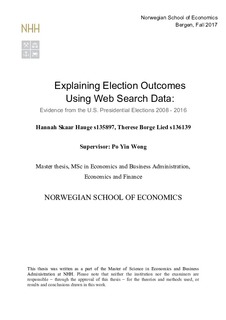| dc.description.abstract | Can Google Trends data be used to proxy socially sensitive sentiments, and can such proxies
explain election outcomes? This thesis analyzes the effects of different social sentiments,
proxied by Google search data, on outcomes for the Republican Party in the 2008, 2012 and
2016 U.S. presidential elections.
We assess the relationship between three socially sensitive sentiments and the outcome of
presidential elections. The sentiments we examine are racial animus, immigration skepticism
and far-right sentiment. We use data on the search terms “nigger” or “niggers”, “Breitbart
News”, “Stormfront” and “Drudge Report”, and “Illegal immigration and residence” ahead of
the three latest U.S. presidential elections to assess the prevalence of these sentiments. We
look at the sentiments in both a long-term context, over a year, and short-term context, over
two weeks.
Using a fixed effects model controlling for both state and time fixed effects, we find a
positive effect of long-term immigration skepticism, and both long-term and short-term farright
sentiment, on the Republican election outcome. The estimated effects are small in
magnitude. However, in the context of presidential elections, where a change of 1 percentage
point can alter the election outcome, even small effects have potentially large consequences.
Thus, our findings should be of value to both opinion pollsters and campaign strategists.
Also, our analysis shows that higher increases than 1 index point in the proxied social
sentiments should be regarded when interpreting the estimated effects, suggesting that the
actual effect on the election outcome is likely larger in magnitude.
The findings presented are especially interesting in two regards. Firstly, they contribute to the
existing literature on the use of Internet search data in predicting and explaining election
outcomes, as well as the literature on determinants of voting. Secondly, they bolster the
argument for consideration of web search data in future election predictions and analyses.
Further, the size, variation and availability of search data increases constantly due to
continuing and substantial growth in online searches. | nb_NO |
